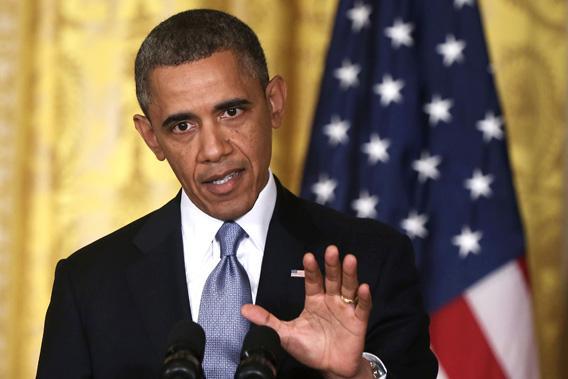For months, President Obama has been resisting the chorus of voices outside the administration (and the advisers closer at hand) asking that he back Syria’s rebels. The death toll climbed to nearly 93,000, and the president did not move. Refugees flooding in to Jordan by the thousands each day didn’t change his mind. Worries that the Syrian civil war was destabilizing the region didn’t move him. Nor did the increased involvement of Hezbollah. This week, former President Bill Clinton (in his own uniquely colorful way) said Obama should act. Now, the president is moving. In a brisk escalation of the U.S. involvement in Syria, the United States will provide military aid to rebels fighting President Bashar al-Assad. The move, we are told, came after U.S. intelligence determined that the Syrian regime has deployed chemical weapons, resulting in up to 150 deaths.
The understandable question presents itself: Why are 150 deaths the tipping point when nearly 93,000 were not? White House deputy national security adviser Ben Rhodes explained that by using chemical weapons, Syria has violated international norms.
Remember the norms! That is not exactly a rallying cry, but if the United States one day finds itself bogged down in Syria, it is the one the administration has chosen. There is always a tension in foreign policy between its inherent messiness, which keeps presidents from taking action, and the clean and clear justifications used to explain action once they decide to take it. We’re seeing that play out now in Syria.
The confusion results from the fact that foreign policy is calculus, which is about change and complexity, but presidents have to make it seem like algebra, which is about orderly operations. The press exacerbates the tension, too. Bill Clinton’s remarks were written up as a sharp critique of Obama, but when you look at what Clinton was saying, it was actually very measured. “Sometimes it’s just best to get caught trying,” said Clinton, “as long as you don’t overcommit—like, as long as you don’t make an improvident commitment.” Not getting caught making an “improvident commitment” was exactly what Obama was worried about.
Obama highlighted this tension between calculus and algebra in his most famous comments about Syria’s chemical weapon stockpiles. He said Assad’s use of chemical weapons would constitute crossing a “red line.” The term has a specific meaning. When a red line is crossed, something happens. That’s what administration officials are claiming has happened—Assad went too far, and Obama is taking action.
But the president’s original comments were never so black and white: “We have been very clear to the Assad regime, but also to other players on the ground, that a red line for us is we start seeing a whole bunch of weapons moving around or being utilized. That would change my calculus. That would change my equation.” (You can tell a president is not trying to be clear when he starts talking backward: “a red line for us is … ”)
The algebraic formulation would be that if Assad used chemical weapons, the United States would retaliate. That would have been too much, so instead the president invoked calculus. There were loopholes. What constitutes a “whole bunch” of chemical weapons? The president also never promised what would happen after the line was crossed, only that the president would change his “calculus.”
The president’s remarks were probably a bluff meant to keep Assad from launching a massive chemical attack. Now that Assad has tested Obama’s resolve, we’re learning what a relatively small-scale attack triggers. But we’re not learning much. Despite the administration saying that a red line has been crossed, there is a good deal of vagueness about what is going to happen. Rhodes said he would not lay out the administration’s next steps in specific detail. There may be legitimate reasons for this secrecy (more calculus), but it highlights another reason you shouldn’t talk about foreign policy like arithmetic. Even the very idea that the president is now taking military action to support the rebels is a bit of a dodge because it has been an open secret for a while that CIA and military personnel are in Syria helping train rebels and making sure weapons get to the right resistance fighters, as opposed to the radicals or those affiliated with al-Qaida.
The next move will be reported (or leaked) soon enough. Then the public will start to determine whether the violation of norms justified whatever action the president ordered. The president has already confronted this complexity in Libya, where he tried to justify intervention to a war-weary nation on the basis of norms. In that instance, the president said that the international community had the responsibility to intervene when a state fails to protect its population from mass atrocities. The president described protecting the innocent in Libya as an American value. And allowing Qaddafi to massacre his people would have “stained the conscience of the world.” But he added a second variable to the equation—the United States was taking action in Libya because it had the unique military capability to do so. In Syria, it doesn’t look like the president is going to add that second element; his advisers say he has ruled out boots on the ground or a no-fly zone (although that may be slipping, too). For now, norms will have to do.
The problem with using norms as a pretext for action is that norms are inherently slippery. They shift and move by design. The application of norms is selective and contingent on the political context. Usually what we want is an explanation of why acting is in our national interest. The problem is that the president appears to have shot down all the other good reasons to intervene. When you’re justifying your actions on nothing more than norms, you’re already in a weak place. When you don’t admit it and try to use those very norms to sell your policy, you’re in an even weaker place.
